#justice neil gorsuch
Explore tagged Tumblr posts
Text
On Thursday, Justice Neil Gorsuch released a 26-page opinion venting outrage about a legal dispute that does not exist, involving websites that do not exist. Yet this case, built on imaginary grounds, will have very real consequences for LGBTQ consumers, and for anti-discrimination laws more broadly. All of the Court’s Republican appointees joined Gorsuch’s opinion in 303 Creative v. Elenis.
That said, the fake dispute that Gorsuch imagines in his 303 Creative opinion involves a reasonably narrow legal question.
In the past, Christian right advocates have sought sweeping exemptions from state and federal civil rights laws, rooted in their expansive notion of “religious liberty.” Often, these lawsuits claimed that the Constitution’s safeguards for people of faith allow anyone who objects to LGBTQ people on religious grounds to defy any law prohibiting anti-LGBTQ discrimination.
303 Creative involves a much narrower dispute. The case centers on Lorie Smith, a website designer who wishes to expand her business into designing wedding websites — something she has never done before. She says she’s reluctant to do so, however, because she fears that if she designs such a website for an opposite-sex couple, Colorado’s anti-discrimination law will compel her to also design wedding websites for same-sex couples. And Smith objects to same-sex marriages.
As Gorsuch summarizes her claim, Smith “worries that, if she [starts designing wedding websites,] Colorado will force her to express views with which she disagrees.”
This is not a religious liberty claim, it is a free speech claim, rooted in well-established law, which says that the First Amendment forbids the government from compelling people to say something that they would rather not say. In ruling in Smith’s favor, the Court does not say that any religious conservative can defy any anti-discrimination law. It simply holds that someone like Smith, who publishes words for a living, may refuse to say something they don’t want to say.
The full implications of Gorsuch’s opinion are not entirely clear. In the past, religious conservatives have argued that artists and artisans of all kinds — including bakers, photographers, and floral arrangement designers — should also be allowed to discriminate under the First Amendment, because all artistic work necessarily entails some kind of expression. Gorsuch punts on this question, writing that “hypotheticals about photographers, stationers, and others, asking if they too provide expressive services covered by the First Amendment,” are not present in the 303 Creative case.
And it is worth emphasizing that the particular kind of work that Smith does, writing words on a publicly available website, fits more snugly within the First Amendment than a similar claim brought by a wedding cake designer or a florist.
Before this case was argued, I wrote that if Lorie Smith had been approached by a same-sex couple and refused to design a wedding website for them, and if she had then been sued for refusing to do so, then she would have a very strong First Amendment defense against such a suit. As the Supreme Court said in Rumsfeld v. Forum for Academic and Institutional Rights (2006), “freedom of speech prohibits the government from telling people what they must say.” And that includes the right of a web designer to refuse to write words on a website that they do not wish to write.
But none of these events have actually happened. And, for that reason, the Supreme Court should have dismissed the case.
THIS CASE SHOULD HAVE NEVER MADE IT THIS FAR
The frustrating thing about this case is that it involves an entirely fabricated legal dispute. Again, Lorie Smith has never actually made a wedding website for a paying customer. Nor has Colorado ever attempted to enforce its civil rights law against Ms. Smith. Indeed, in its brief to the Supreme Court, Colorado expressed doubt that its anti-discrimination law would even apply to Smith.
Yet Gorsuch’s majority opinion repeatedly paints Smith as a hapless victim, oppressed by wicked state officials who insist that she must proclaim a dogma that she denies. As he writes in the very first paragraph of his opinion, “Colorado does not just seek to ensure the sale of goods or services on equal terms. It seeks to use its law to compel an individual to create speech she does not believe.”
This claim is simply untrue. Colorado has not brought any enforcement action against Smith, or taken any other step to compel her to say anything at all — or to design any website that she does not want to design. Nor has anyone ever sued Smith for allegedly violating Colorado’s anti-discrimination law.
Indeed, in one particularly amusing turn, Smith alleged during an early stage of this litigation that she was approached by a man about doing some design work for his wedding to another man. Yet, after the New Republic’s Melissa Gira Grant contacted this man, she learned that he never reached out to Smith — and that he was married to a woman.
These facts matter because federal courts, including the Supreme Court, do not have jurisdiction to decide hypothetical cases. As a unanimous Supreme Court held in Texas v. United States (1998), “a claim is not ripe for adjudication if it rests upon ‘contingent future events that may not occur as anticipated, or indeed may not occur at all.’” So the Court should have told Smith to go away and come back when she had a real dispute with the state of Colorado.
303 Creative, moreover, is the second time Gorsuch has taken such liberties with the truth in order to rule in favor of a religious conservative. Almost exactly one year ago, Gorsuch handed down the Court’s decision in Kennedy v. Bremerton School District (2022), a case about a public school football coach who, after games, would walk to the center of the 50-yard line and ostentatiously kneel down and pray before students and spectators — often while surrounded by players, community members, and even members of the press.
Indeed, in her dissent in Bremerton, Justice Sonia Sotomayor included a photo of Coach Kennedy holding such a prayer session, as a throng of uniformed football players and other individuals kneel with him, and as people holding video cameras look on.
And yet, Gorsuch’s opinion in Bremerton claimed that Kennedy merely wanted to offer a “short, private, personal prayer,” and then Gorsuch ruled in favor of Kennedy based on this fabricated version of Kennedy’s actual conduct.
Needless to say, this is aberrant behavior by a Supreme Court Justice — and really by six Supreme Court justices, since all of the Court’s Republican appointees joined Gorsuch’s decisions in 303 Creative and Kennedy.
#us politics#news#vox#2023#us supreme court#SCOTUS#303 Creative v. Elenis#republicans#conservatives#justice neil gorsuch#religious liberty#republican homophobia#anti lgbtq discrimination#lgbtqia+ rights#lgbtqia+#Lorie Smith#Rumsfeld v. Forum for Academic and Institutional Rights#Texas v. United States#Kennedy v. Bremerton School District#justice sonia sotomayor
152 notes
·
View notes
Text

#us politics#news#politico#us supreme court#scotus#roe v wade#Justice Samuel Alito#planned parenthood#Planned Parenthood v. Casey#justice clarence thomas#justice neil gorsuch#justice brett kavanaugh#justice amy coney barrett#justice stephen breyer#justice Sonia Sotomayor#justice Elena Kagan#Dobbs v. Jackson Women’s Health Organization#us constitution#Justice Ruth Bader Ginsburg#laurence tribe#14th amendment#us history#2022#biden administration#abortion is better than negligence#abortion is a human right#abortion is a right#abortion is not a crime#abortions#abortion bans
4 notes
·
View notes
Text
New Post has been published on Books by Caroline Miller
New Post has been published on https://www.booksbycarolinemiller.com/musings/findidng-the-golden-mean/
Findidng The Golden Mean

My U. S. Senator voted against the Ukrainian-Istreal aid package that Congress passed recently. He said he opposed it because of Benjamin Netanyahu’s conduct in the Gaza war. I like my Senator. Nonetheless, I sent him an email that accused him of being long on principle, but short on common sense. The bill he rejected included aid for the people of Gaza, victims forced to live in tents under a barrage of bombs. We live in an imperfect world, so life requires compromises. People with pollen allergies, for example, accept that bees need clover fields to survive. Sometimes, imperfection can […]
#Article 111 of Constitution#Benjamin Netanyahu#Cheif Justice John Marshall#court stripping#Donald Trump#Golden Mean#Justice Clarence Thomas#Justice Neil Gorsuch#Maybury v. Madison#presidential immunity#Roe v Wade#Speech & Debate in U. S. Constitution#Supreme Court code of ethics#Ukrainian-Isreal aid
0 notes
Text

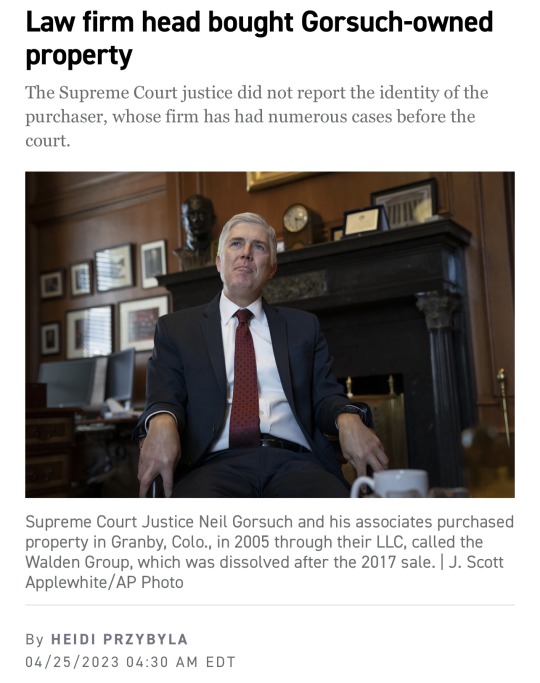
Justice Gorsuch sold property to a lawyer whose firm had numerous cases in front of the Court.
On April 16 of 2017, Greenberg’s Brian Duffy put under contract the 3,000-square foot log home on the Colorado River and nestled in the mountains northwest of Denver, according to real estate records.
He and his wife closed on the house a month later, paying $1.825 million, according to a deed in the county’s record system. Gorsuch, who held a 20 percent stake, reported making between $250,001 and $500,000 from the sale on his federal disclosure forms.
Gorsuch did not disclose the identity of the purchaser. That box was left blank.
Since then, Greenberg Traurig has been involved in at least 22 cases before or presented to the court, according to a POLITICO review of the court’s docket.
They include cases in which Greenberg either filed amicus briefs or represented parties. In the 12 cases where Gorsuch’s opinion is recorded, he sided with Greenberg Traurig clients eight times and against them four times.
In addition, a Denver-based lawyer for Greenberg represented North Dakota in what became one of the more highly publicized rulings in recent years, a multistate suit which reversed former President Barack Obama’s plan to fight climate change through the Clean Air Act.
Gorsuch joined the court’s other five conservative judges in agreeing with the plaintiffs — including Greenberg’s client — that the Environmental Protection Agency had overstepped its authority by regulating carbon emissions from power plants in the decision that makes it more difficult for the executive branch to regulate emissions without express authorization from Congress.
(continue reading)
#politics#neil gorsuch#scotus#republicans#clarence thomas#justice for sale#crony capitalism#john roberts court#federalist society#the federalist society
46 notes
·
View notes
Link
#Courts#Federal Government#Adi Martinez-Roman#American Samoa#Contextomy#Dred Scott#Guam#Insular Cases#Isabel Gonzalez#Justice Manual#Neal Katyal#Neil Gorsuch#Neil Weare#Northern Mariana Islands#Puerto Rico#United States Department of Justice#United States Virgin Islands
0 notes
Text
Women AND Men, Unite, Abortion Rights-in EACH State
Well folks, it appears that since a few of the Supreme Court Justices lied about their stance on Roe v Wade and ended up causing the court to throw away that HARD-FOUGHT battle to have Abortion Rights – UNIVERSALLY, across the country. No variation in separate states – all states followed Roe v Wade, whether they liked it or not Women, it now seems that you have to unite in each of the 50…
View On WordPress
#abortion#abortion rights#Brett Kavanaugh#Neil Gorsuch#roe v wade#supreme court#supreme court justices
0 notes
Photo
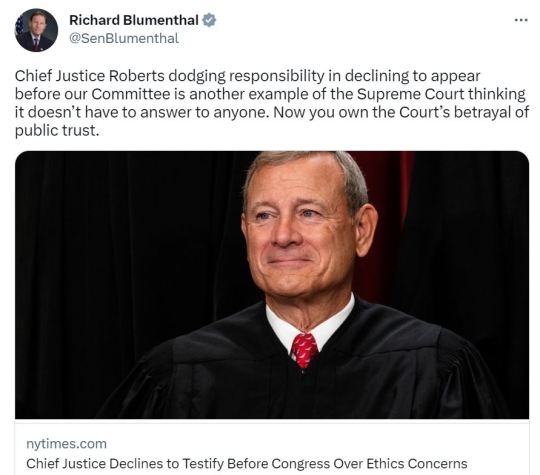

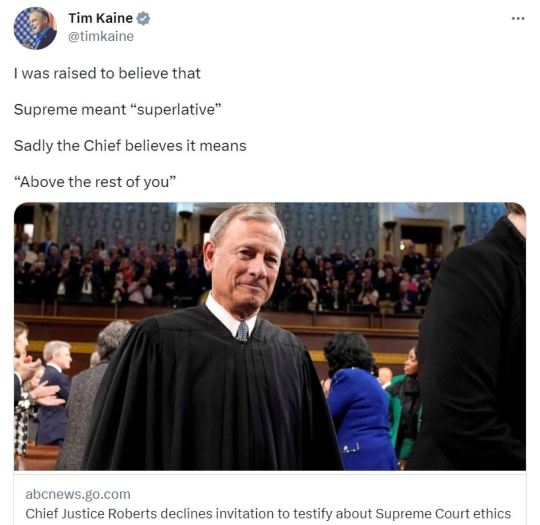
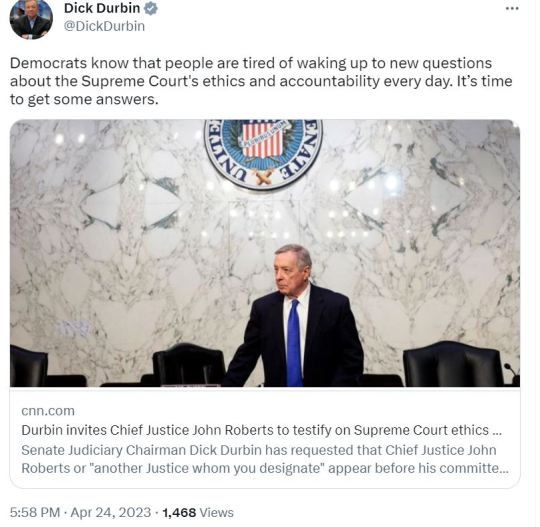
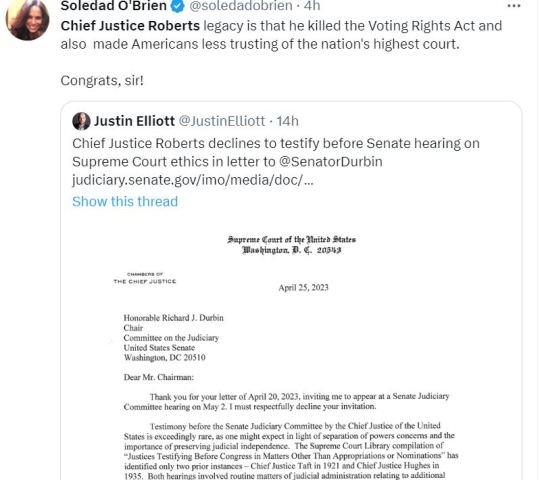
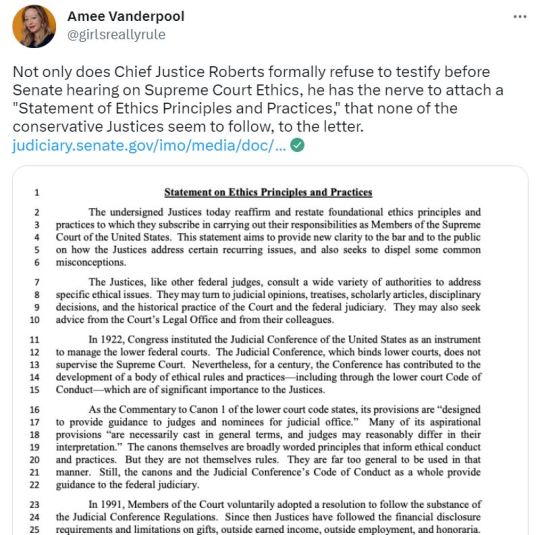
#cheif justice roberts#congress#john roberts#scotus#supreme court#scotus is compromised#corruption#neil gorsuch#clarence thomas#brett kavanaugh#vote blue#vote blue to save democracy
1 note
·
View note
Text
By Chris Williams
New Yorkers are known for having a temper. Some blame it on the traffic and dirty water hog dogs. Personally? I blame it on the cost of living. If you compare the value of $20 in 1970 New York to $20 in the Big Apple now, the cost of living has gone up a whopping 677.46%. A big part of that increase has been housing. Back in 2012, a man ran an entire campaign premised on the rent being too damned high. But, man, if you thought New Yorkers were pissed about rent prices back then… wait until they really can’t afford rent.

Before we even get to the obvious ethical issues involved with Clarence Thomas and Samuel Alito sitting on this case despite receiving lavish gifts from landowners with a vested interest in this matter, it is worth taking a second to reflect on the Supreme Court’s drift from just a decade ago.
It would still be newsworthy if the Court decides to even hear the case. A little over a decade ago, James Harmon tried to bring a very similar case to the Supreme Court, arguing that the New York’s rent stabilization law constituted a taking. The Court ultimately decided against hearing Harmon’s case. With that in mind, read an assessment given based on that case a decade ago in The Tenant:
“If the Supreme Court chooses to consider the Harmons’ lawsuit, it would mean that four Justices—presumably Roberts, Antonin Scalia, Clarence Thomas, and Samuel Alito—believe there is a valid argument for a radical expansion of property rights, that destroying legal protections for tenants is as much an idea whose time has come as abolishing racial segregation was in 1954.”
It can be startling to see how quickly opinions on the judiciary can change. In framing the above quote, the author brought up the importance of precedent, citing cases like Roe, Brown, and Lawrence v. Texas. The thinking at the time was that even if the Court wasn’t the biggest fan of a given outcome, it’d respect the decisions of the jurists before them. Clearly written before Dobbs and Sackett, but the rest ages pretty well.
Now we’ve subbed Gorsuch into that foursome that couldn’t come together… and added Kavanaugh and Barrett.
The YOLO Court era has arrived. Because who’s to stop them?
If the Court gets rid of rent control, it is hard to understate the significance it would have on the lives of New Yorkers. From Lever News:
“Samuel Stein, a housing policy analyst at the Community Service Society, an anti-poverty organization in New York, said if the Supreme Court were to overturn the rent stabilization law, ‘It’s the end of New York City.’
‘Rents would go up significantly around the city,’ he continued. ‘There will be a tremendous amount of displacement. You will have a lot of people leaving New York City, you will have a lot of homelessness, you’ll have a lot of overcrowding.’”
There was a point in time you could rely on the Court to respect stare decisis. Dobbs and Bruen show that’s no longer the case. If ever a Court was willing to get rid of the 50+ years of rent control, it would be the Roberts court.
We should find out if they will hear the case by the end of September.
#us politics#news#above the law#op eds#2023#us supreme court#scotus#new york#rent control#twitter#tweet#david sirota#JusticeClarence Thomas#justice samuel alito#James Harmon#The Tenant#Lever News#justice neil gorsuch#justice brett kavanaugh#Justice amy Coney Barrett#rent stabilization laws
93 notes
·
View notes
Text
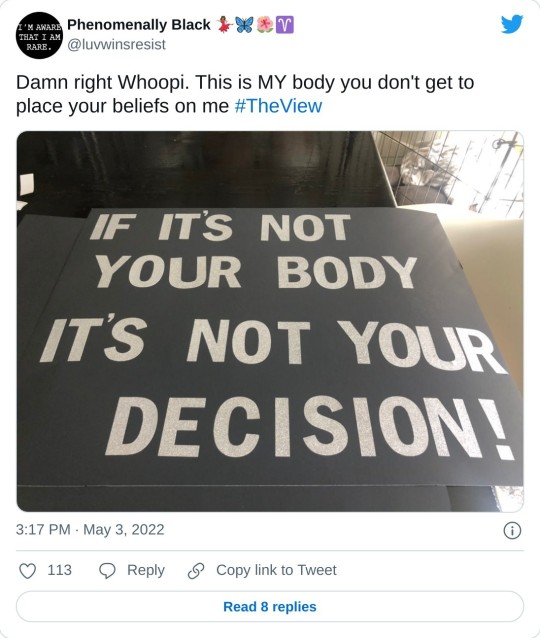
#Yes!!! 🔥🔥🔥🔥💥💥💥💥😴#Thisss#for real#yup#this this this this#honestly#this this this#us politics#news#politico#us supreme court#scotus#roe v wade#Justice Samuel Alito#planned parenthood#Planned Parenthood v. Casey#justice clarence thomas#justice neil gorsuch#justice brett kavanaugh#justice amy coney barrett#justice stephen breyer#justice Sonia Sotomayor#justice Elena Kagan#Dobbs v. Jackson Women’s Health Organization#us constitution#Justice Ruth Bader Ginsburg#laurence tribe#14th amendment#us history#2022
2 notes
·
View notes
Text
New Post has been published on Books by Caroline Miller
New Post has been published on https://www.booksbycarolinemiller.com/musings/findidng-the-golden-mean/
Findidng The Golden Mean

My U. S. Senator voted against the Ukrainian-Istreal aid package that Congress passed recently. He said he opposed it because of Benjamin Netanyahu’s conduct in the Gaza war. I like my Senator. Nonetheless, I sent him an email that accused him of being long on principle, but short on common sense. The bill he rejected included aid for the people of Gaza, victims forced to live in tents under a barrage of bombs. We live in an imperfect world, so life requires compromises. People with pollen allergies, for example, accept that bees need clover fields to survive. Sometimes, imperfection can be a positive force. Donald Trump’s flawed presidency has taught us that our 235-year-old Constitution may do more than guarantee equality for all. If the Supreme Court upholds Trump’s claim of presidential immunity, it will mean our head of state is a monarch able to commit any crime without fear of consequences. The High Court considered Presidential immunity concerning civil conduct three decards ago. A case in 1982 involving Richard Nixon ended with a decision that gave a sitting President a degree of absolution. The Constitution makes no mention of that, but the judges based their findings on the Speech or Debate section of the document. It grants civil immunity to members of Congress. Trump pushes the envelope when he argues that immunity extends to Presidential crimes. If the integrity of some jurists deciding Trump’s case weren’t also in disrepute, all might be well. But the High Court has been slow to promulgate rules of conduct for itself and members like Neil Gorsuch and Clarence Thomas have shown little inclination to police themselves. A citizen may wonder how these appointed jurists came to hold their sweeping authority over the Executive and Legislative branches of government. Article 111 of the Constitution restricts them to disputes between the states or those arising among ambassadors and other high-ranking ministers. Their expanded authority arose from Maybury v. Madison. In 1801, before leaving office, President John Adams commissioned William Maybury to be a justice of the peace. Adams’s successor, James Madison, refused to deliver the appointment, so Marbury sued. Taking the Federal government to court was novel, so before hearing the argument, the Supreme Court had to determine if it had jurisdiction. Chief Justice John Marshall decided that Maybury’s petition raised a legal question, so the Court could rule. That opinion which was never challenged was far-reaching. The Constitution, being silent on the matter, Marshall and his cohorts chose to reserve for themselves extraordinary power over the two other branches of government. Article 111 does offer a defense against an overreaching judiciary. Court-stripping permits Congress to limit or reduce a state court’s jurisdiction in federal matters except for those originally granted. The remedy poses complications that I’m not qualified to discuss. What matters is that besides Court-stripping, Congress has only one other way to assert its authority. It can write new legislation. If a bill fails, the judicial ruling stands. Because the High Court chooses the cases it hears, its involvement can seem political. For example, when it overturned Roe v. Wade with its almost 50-year-old standing, members of the public were outraged and called for a change in that body’s composition, either by adding to the number of members or imposing term limits Times of social and political upheaval can encourage extremism. Some people become heated enough to demand a scorched earth policy and let democracy be damned. Those of us standing in the middle watch in awe. Fortunately, enough of us exist to enforce the Golden Mean. At once a mathematical and philosophical construct, the Golden Mean, which also exists in nature, calls for a middle way–living without the extremes of excess and deficiency. It teaches that compromise enables inclusion. In ancient thought, it defined a moral life. When my Senator rejected aid for Gaza because the package was imperfect, he abandoned the middle way. He also forgot two important truths. First, he forgot that Israel is our ally and the only democracy in the Middle East. Its citizens deserve our support regardless of Netanyahu’s crimes. He will answer for his conduct in his country’s next election and, eventually, at the International Criminal Court in Haag. Second, my Senator forgot that imperfection attends to every human endeavor. Purity is the posture of angels and those who imagine they are.
#Article 111 of Constitution#Benjamin Netanyahu#Cheif Justice John Marshall#court stripping#Donald Trump#Golden Mean#Justice Clarence Thomas#Justice Neil Gorsuch#Maybury v. Madison#presidential immunity#Roe v Wade#Speech & Debate in U. S. Constitution#Supreme Court code of ethics#Ukrainian-Isreal aid
0 notes
Video
youtube
How We Take Back the Supreme Court
Where do you see yourself in 2060? What about your kids or grandkids? Will Donald Trump be affecting your life even then?
Here’s why he might be.
This November, the future of the Supreme Court is on the ballot.
Trump appointed three justices in his first term — more than any president since Ronald Reagan. And thanks to them, Trump was able to get rid of Roe v. Wade, affirmative action, and gun safety laws — even after he left office.
If Trump is reelected, 76-year-old Justice Clarence Thomas and 74-year-old Justice Samuel Alito could retire, giving Trump a chance to appoint a fourth and fifth justice. That’s five out of nine justices. Trump would be the first president in more than a half century to appoint a majority of the Supreme Court.
And not just a "conservative" majority — but a MAGA majority that would work in lockstep with an authoritarian president.
Several other justices are also getting up there. Chief Justice John Roberts will turn 70 in 2025, and Justice Sonia Sotomayor will be 71. So it’s possible that Trump could even appoint a sixth (or even a seventh) justice.
If Trump sticks with appointing justices in their 40s, as he did with Neil Gorsuch and Amy Coney Barrett, his justices could dominate the court past the year 2060 — or longer if he appoints even younger justices.
In the court’s latest term, the extremists now dominating the bench made it harder to combat racial gerrymandering. They limited the power of federal agencies to implement health, safety, and environmental regulations. They ruled that homeless people can be punished for being homeless. They gave the greenlight for state and local politicians to accept bribes for past actions. And I didn’t even mention how the court granted presidents the power of kings by giving them broad immunity from prosecution.
All of this because one man, Donald Trump, was elected in 2016. If he’s reelected in 2024, just imagine the damage a MAGA supermajority Supreme Court could unleash.
Your remaining reproductive freedoms, marriage equality, gun reform, climate change policy, and what’s left of the Voting Rights Act���
Wherever you imagine yourself and your family forty years from now, you will still be feeling the effects of this year’s election.
422 notes
·
View notes
Quote
Justices Samuel Alito and Neil Gorsuch used a range of hypotheticals — pointedly including recognizable conduct by liberals — to demonstrate the supposed breadth of the obstruction statute, and to downplay an argument deployed by the government: the insurrection was a singular moment in American history that does not invite easy comparisons. “What happened on January 6 was very, very serious, and I’m not equating this with that,” Alito said, before citing Monday’s pro-Gaza protest on the Golden Gate bridge and stringing together a hypothetical where a similar protest blocks members of Congress from getting to a vote. “Would pulling a fire alarm before a vote qualify for 20 years in federal prison?” Gorsuch asked incredulously, clearly alluding to Rep. Jamaal Bowman (D-NY).
Right-Wing Justices Haggle Over Law Used To Nab January 6 Rioters
These corrupt, deeply dishonest, right wing activists cosplaying as Justices sure do love their hypotheticals, don’t they.
262 notes
·
View notes
Text


Elena Kagan issued a devastating dissent to the decision of her hard-right fellow supreme court justices to overturn the Chevron doctrine that has been a cornerstone of federal regulation for 40 years, accusing the majority of turning itself into “the country’s administrative czar”.
Kagan said that in one fell swoop, the rightwing majority had snatched the ability to make complex decisions over regulatory matters away from federal agencies and awarded the power to themselves.
“As if it did not have enough on its plate, the majority turns itself into the country’s administrative czar,” she wrote.
For 40 years, she wrote, the Chevron doctrine, set out by the same supreme court in a 1984 ruling, had supported regulatory efforts by the US government by granting federal experts the ability to make reasonable decisions where congressional law was ambiguous. She gave a few examples of the work that was facilitated as a result, such as “keeping air and water clean, food and drugs safe, and financial markets honest”.
Now, the hard-right supermajority had flipped that on its head.
Instead of federal experts adjudicating on all manner of intricate scientific and technical questions – such as addressing the climate crisis, deciding on the country’s healthcare system or controlling AI – now judges would make those critical calls.
Kagan, displaying no desire to pull her punches, portrayed Friday’s ruling as a blatant power grab by the chief justice, John Roberts, and his five ultra-right peers, three of whom were appointed by Trump – Neil Gorsuch, Brett Kavanaugh and Amy Coney Barrett.
“A rule of judicial humility gives way to a rule of judicial hubris,” she wrote.
Not for the first time, her most caustic comments relate to stare decisis – the adherence to legal precedent that is the foundation stone of the rule of law. Respect for the previous judgments of the supreme court is a reminder to judges that “wisdom often lies in what prior judges have done. It is a brake on the urge to convert every new judge’s opinion into a new legal rule or regime.”
By contrast, she went on: “It is impossible to pretend that today’s decision is a one-off, in its treatment of precedent.”
It has become an unquestionable pattern: the new hard-right supermajority has a fondness for tearing up their own court’s precedents stretching back decades. They did it when they eviscerated the right to an abortion in 2022, upending 50 years of settled law; they did it again last year when they prohibited affirmative action in university admissions, casting out 40 years of legal precedent; and now they’ve done it once more after 40 years to Chevron.
“Just my own defenses of stare decisis, my own dissents to this court’s reversals of settled law, by now fill a small volume,” Kagan said, her final words as plaintive as they were defiant.
(continue reading)
178 notes
·
View notes
Text
Driven by hardline prosecutors and tough-on-crime governors, the number of executions jumped 64 percent in 2022 and increased again in 2023 to a total of 24, the highest in five years.
Perhaps the most crucial player in the death penalty’s resurrection, though, is the U.S. Supreme Court, whose historic role of maintaining guardrails has given way to removing roadblocks. Under the conservative supermajority put in place by President Donald Trump, the justices are far more likely to propel an execution forward than intercede to stop it, including in cases where guilt is in doubt or where the means of carrying it out could result in a grotesque spectacle of pain and suffering.
...
In 1976, the Supreme Court famously declared that “death is different,” and demanded an extra level of scrutiny because a mistake is irreversible. Historically, in particularly troubling instances involving state misconduct or abysmal defense lawyering, the Court sometimes intervened at the eleventh hour — from 2013 to 2023, it stayed an execution just 11 times and vacated stays of execution 18 times, according to Bloomberg Law.
Since the death of Justice Ruth Bader Ginsburg and her replacement with Amy Coney Barrett in 2020, the Court has stopped an execution only twice and reversed a lower court to permit an execution nine times. In 2023, 26 condemned prisoners asked the Court to hear their cases; 25 were rejected. The message is clear: Prosecutors eager to seek and swiftly impose death sentences can reliably do so without judicial interference.
...
In Bucklew v. Precythe, a majority of the court opined that the Eighth Amendment’s prohibition against cruel and unusual punishment “does not guarantee a prisoner a painless death — something that, of course, isn’t guaranteed to many people, including most victims of capital crimes.” In the court’s reasoning, the excruciating pain the defendant might suffer during execution paled in comparison with the terror and mayhem he inflicted during his crimes.
In that same opinion, the Court indicated an impatience with pausing executions while it considered whether to hear the underlying claims from appellate attorneys. Justice Neil Gorsuch warned his colleagues to be skeptical when reading eleventh hour death row appeals: “Last minute stays should be the extreme exception, not the norm.”
It has been. Consider the 13 federal prisoners who were sent to the death chamber in the final months of Trump’s presidency. In a series of terse orders, issued without briefing, argument or public airing of the legal issues, the court blessed the rushed, furious pace. Using this opaque process, which legal scholars call the “shadow docket,” the justices erased lower-court injunctions against executions in seven cases and turned away last-minute requests for stays in the other six. During the 16 years in which Barack Obama and George W. Bush occupied the White House, the Court had invoked the shadow docket to rule for the government a total of four times and “never in a death penalty case,” according to Stephen Vladeck, a professor at the University of Texas School of Law. In Trump’s single term in office, the number jumped to 28, including non-capital cases.
More recently, the Court has rejected cases that advocates say are riddled with error or rest on shaky evidence.
...
Death penalty cases are notoriously rife with racism, questions of innocence, mental health of the accused and whether they received competent legal counsel. Sometimes the facts are too dire for courts to ignore, and even some pro-death penalty politicians are unwilling to take actions in flagrant violation of established norms. The total number of executions over the past decade is still a fraction of its peak in the 1990s.
And yet, the death penalty machine continues to crank on. These days, the battles over who lives and who dies are increasingly local — waged courtroom by courtroom because the Supreme Court has largely abdicated its decades long role as the final arbiter.
“It is becoming more and more clear that the Court is reluctant to interfere in state court cases even to enforce its own precedent,” said Robin Maher, the executive director of the Death Penalty Information Center. “They are saying, ‘This is not our problem to deal with.’”
An ‘Execute-Them-At-Any-Cost Mentality’: The Supreme Court’s New, Bloodthirsty Era
69 notes
·
View notes
Text
Joan McCarter at Daily Kos:
The U.S. Supreme Court heard Donald Trump’s immunity claim in his federal criminal trial for trying to overturn the 2020 election Thursday, and the conservative majority is likely going to give Donald Trump what he wants: a delay of the trial until after the election. If Trump wins again, the conservatives have essentially signaled that they would be open to blanket immunity for him against any future criminal charges. The fact that Supreme Court justices are suggesting that the president is above the law proves why the court must be reformed. Four of the justices—Clarence Thomas, Samuel Alito, Brett Kavanaugh, and Neil Gorsuch—even went so far as to suggest that special counsel Jack Smith’s entire prosecution is unconstitutional, and they reinforced Trump’s argument that the president is immune. Kavanaugh even told Michael Dreeben, a lawyer from Smith’s office, that it’s a “serious constitutional question whether a criminal statute can apply to the president’s criminal acts.”
That would be the ultimate get-out-of-jail-free card for the chief executive, rubber stamped by the highest court of the land. It’s worth remembering that Thomas refused to recuse himself from this—and most of the Trump election interference cases—despite the fact that his wife, Ginni Thomas, was deeply involved in Trump’s coup attempt. When she testified to the Jan. 6 special congressional committee, she maintained that the election was stolen. His failure to recuse himself comes after a new ethics code has supposedly been enforced, saying that “a Justice should disqualify himself or herself in a proceeding in which the Justice’s impartiality might reasonably be questioned, that is, where an unbiased and reasonable person who is aware of all relevant circumstances would doubt that the Justice could fairly discharge his or her duties.” So much for that suggestion from Chief Justice John Roberts. His code has no teeth, which is yet another reason why ethics reform—and indeed court reform and expansion—is essential.
Joan McCarter writes in Daily Kos that the Trump v. United States "immunity" case is a good reason to reform and expand SCOTUS.
113 notes
·
View notes







